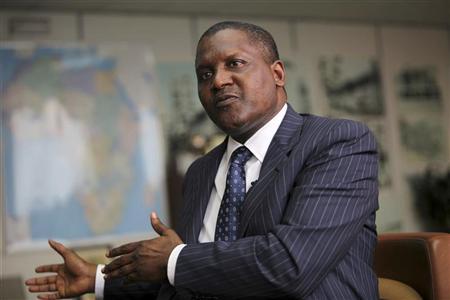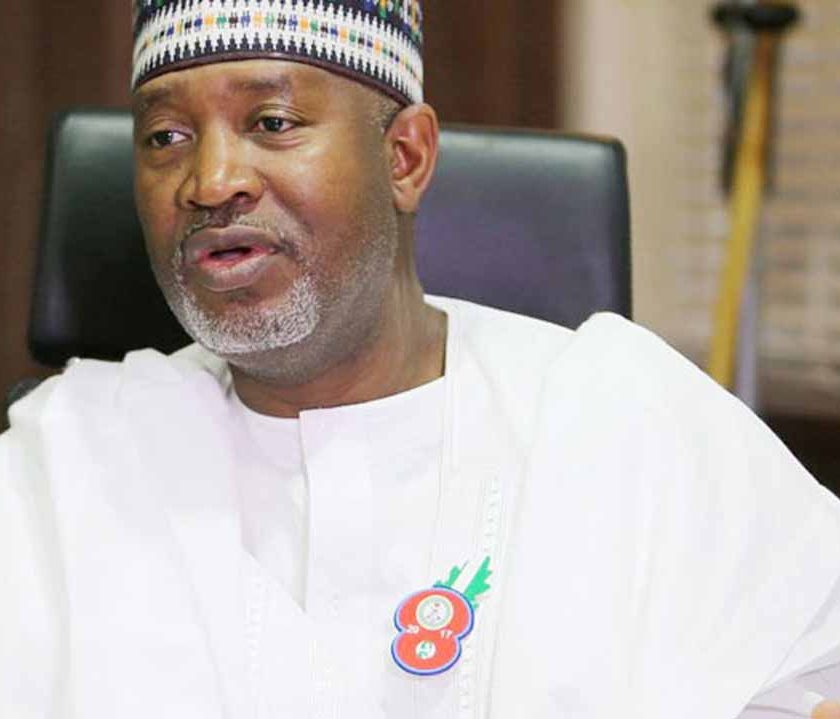Africa’s richest man and President of Dangote Group, Aliko Dangote, has ruled out possibility of him running for Nigeria’s presidency in 2019 general elections or in the near future. Dangote declared that he is not cut out for politics, stating that he is more comfortable with business.
There have been speculations that Dangote might take a shot at the presidency giving his net worth and influence. But Dangote told Bloomberg Markets Magazine that he is not ready to give up his freedom for politics “No, I’m not interested.
There’s quite a lot we can do from the business side. I enjoy a lot of what I am doing and I also love my freedom — and I don’t have too much. The little I have, politics would take away. I am not ready to give that up. There are businessmen who are interested in politics. I’m not one of them,” he said.
He, however, said there is need for cooperation with politicians. He said: “Well, in Africa, yes, I do think you need politicians. But at the same time, we cannot get things right unless there is good cooperation between politicians and businessmen. It’s a win-win.
When you look at it today, in Nigeria, over 85 per cent of the GDP is from the private sector.” On whether he is under pressure to make political donations, he said: “Well, you know the political donation depends on who you are dealing with and who you are donating money to. But the issue is we don’t go and give people in politics money for favours.
“I’ve told presidents of countries, ‘I’m a contractor, I’m running a business, I don’t need any favours.’ And really, when you look at it today, in all our businesses, we don’t need any favours… We’ve done our numbers.
We think this business will work and we don’t need government support.” Dangote said he is satisfied with his successful investment in Africa, declaring that he is considering extending his business interest to Europe, the American and Asian continents.
Specifically, the business mogul has identified Mexico as a destination of interest while the particular Asian country is still under wrap. Disclosing his future investment plans to Bloomberg Markets Magazine, Dangote also revealed his intention to invest up to $50 billion in the United States and Europe beginning as early as 2020 with renewable energy and petrochemicals on the deck.
“Beginning in 2020, 60 per cent of our future investments will be outside Africa, so we can have a balance; our major investment will be in the US and Europe. I think renewables is the way to go forward and the future.
We are looking at petrochemicals, but can also invest in other companies, mostly in Europe and the US, but we can also invest in Asia, in Mexico. “We are looking at petrochemicals, but can also invest in other companies. We must believe in the management and what they are doing. But the priorities are here for now. In 2020, the priorities will change and we’ll diversify because we will have the cash to divest.
“Let’s say that by 2025,I’m looking at between $20 billion and $50 billion. Mind you, we don’t do small things,” he said. On the notion that his firm will compete in Asia, US and Europe, Dangote said: “The market is already big. It’s a big fight, big enough for everyone. We will not go alone; we will have partners, too. Having partners there makes a lot of sense.
“We’ve done $18 billion of business in the span of about four years, which is almost unheard of in Africa. Most people don’t know what is happening in Africa or that we’re the first African company to attempt these endeavours – cement, agriculture and now so much more.
“Sometimes you meet people and they look at you and say, ‘how did this guy get here?’ Because if you say ‘you are in Africa,’ they think Africa is a jungle – that’s the issue. So, unless you go and see, you will not believe these things are happening,” he said.
The industrial giant, whose businesses currently covers cement, sugar, agriculture and an $11 billion oil refinery in Lagos, noted that his knack for widespread investment was not just about making money, but making impact. He said for over 20 years, Dangote was just a trading company, but decided to be an industrial giant by starting somewhere. “It wasn’t just about cement. It was about industrialisation. If you look at what Dangote Group is doing, it’s about improving people’s lives,” he added.
In the last five years, the group has diversified rapidly both geographically and into new industries. Dangote Cement Plc., which accounts for almost 80 per cent of his wealth, has expanded into nine African countries aside from Nigeria. In 2015, he began building a 650,000 barrel-a-day refinery on the outskirt of Lagos and he is constructing gas pipelines to the city from Nigeria’s oil region with US private equity firms, Carlyle Group LP and Blackstone Group LP.
He said he would invest $4.6 billion in the next three years in sugar, rice and dairy production. On his sudden interest in agriculture, Dangote said Africa’s dependence on food importation was uncalled for since the continent had the land and weather to make agriculture thrive. According to him, “when you look at it – not just in Nigeria, but in the rest of Africa –majority of countries here depend on imported food; there is no way you can have a population of 320 million in West Africa and no self sufficiency.
So, the first thing to do is food security. I believe Dangote Group is in the right position to drive this trajectory. “We have land, we have water, we have the climate – we shouldn’t be a massive importer of food. With modern farming you can get eight to 10 tons per hectare. I expect another five to 10 companies to join our efforts in the next year. By 2019, we might be able to actually create about 290,000 jobs in agriculture. And that’s what you can do to empower people, especially those from rural areas.”
The passionate industrialist, however, ruled out moving into newer sectors such as telecommunications or technology, saying: “When I look at telecoms, for instance, I think that would be very tough for us. “Some players have been in this market for 17 years already.
There’s no way you can go and jump over somebody after 17 years of their hard work. So, I think we would pass when it comes to telecoms today. There are other businesses that we understand better.”





